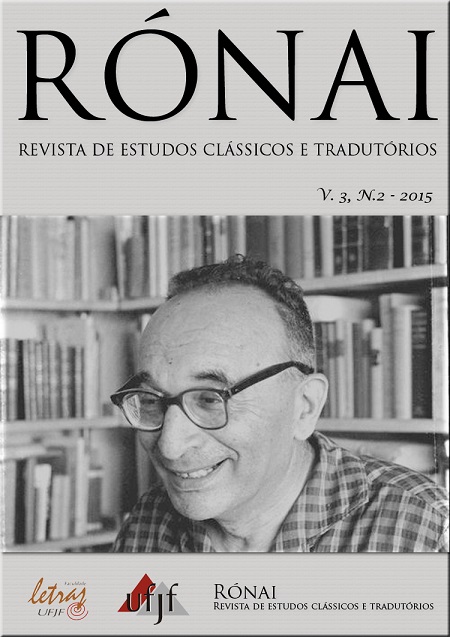The resignification of Epic poetry's structures in Paradise Lost and the context of the invocations
Keywords:
invocation, epic poetry, resignification, English epic of the seventeenth centuryAbstract
In this work, it is intended to observe the way in which the structures of epic poetry are presented in the poem Paradise Lost (1674), regarding more specifically the context of the invocations. It is noticed that Milton makes use of said pagan epics in the construction of a Christian epic poem. Therefore, the focus of this study is to analyze how is this construction made, based on reading of the original English text, in the John Leonard’s edition (2000) and the Portuguese editions of Lima Leitão (1840) and Daniel Jonas (2006), the latter bilingual.
Downloads
References
BURROW, Colin. Epic Romance: Homer to Milton. Oxford: Clarendon Press, 1993.
CEIA. Carlos. E - dicionário de termos literários. Disponível em: <HTTP://www.edtl.com.pt/index.php?option=com_mtree&task=print&link_id=1005&tmpl=component&Itemid=2> Acesso em: 02/11/12 (15h02min)
CLARKE, M. J; CURRIE, B. F.; LYNE, R. O. Epic interactions. Perspectives on Homer, Virgil, and the Epic Tradition. Presented by Jasper Griffin. Oxford: OUP, 2006.
COOK, Patrick J. Milton, Spenser and the Epic Tradition. Ashgate Pub, 1999.
DANIELSON, Dennis. The Cambridge Companion to Milton. New York: Cambridge University Press, 1989.
FARRELL, Joseph; PUTNAM, Michael (ed.) A Companion to Vergil’s Aeneid and Its Tradition. Willey Blackwell, 2010.
FERNANDES, Fabiano Seixas. Paradise Lost em português. TransTerm, São Paulo, v.20, dezembro/2012, p. 51-67.
FOWLER. Don. On the Shoulders of Giants: Intertextuality and Classical Studies. In: Roman Constructions – Readings in Postmodern Latin. London: Oxford University Press: 2002.
HANSEN, João Adolfo. Notas sobre o Gênero Épico. In: TEIXEIRA, Ivan (org.). Épicos: Prosopopeia. O Uruguai. Caramuru. Vila Rica. A Confederação dos Tamoios. I – Juca Pirama. São Paulo: EdUSP, 2008.
HARDWICK, Lorna; STRAY, Christopher. A Companion to Classical Receptions. UK: Blackwell Publishing, 2008.
HOMÈRE. Iliade. Texte établi et traduit par Paul MAZON. Paris: Les Belles Lettres, 1992.
________. L'Odyssée. Texte établi et traduit par Victor BÉRARD. Paris: Les Belles Lettres, 2009.
HOMERO. Ilíada. Tradução de Carlos Alberto Nunes. Rio de Janeiro: Nova Fronteira, 2011.
__________.Odisseia. Tradução de Carlos Alberto Nunes. Rio de Janeiro: Ediouro, 2004.
LEWALSKI, Barbara Kiefer. Paradise Lost and the Rhetoric of Literary Forms. New Jersey: Princeton University Press, 1985.
__________. Genre. In: Corns, Thomas N. (ed.). A Companion to Milton. Oxford: Blackwell Publishing Ltd, 2003 p. 12-13.
LEWIS, C.S. A preface to Paradise Lost. London: Oxford University Press, 1960 [1942].
LOEWENSTEIN, David. Milton Paradise Lost – A Student Guide. New York: Cambridge University Press, 2004[1993].
MACHACEK, Gregory. Milton and Homer: "Written to Aftertimes". Pittsburgh: Duquesne University Press, 2011.
MARTINDALE, Charles. Milton’s Classicism. In: Hopkins, David & Martindale, Charles (eds). The Oxford History of Classical Reception in English Literature. Vol. 3. OUP: 2012. p. 53-90.
__________. Milton and the Transformation of Ancient Epic. Bristol Classical Press, 2002.
MILTON, John. O Paraíso Perdido. Tradução de António José Lima Leitão. Belo Horizonte, Rio de Janeiro: Villa Rica, 1994.
__________. Paraíso Perdido. Tradução, introdução e notas de Daniel Jonas. Lisboa: Cotovia, 2006.
__________. Paradise Lost. In: PHI # 5.3 (Miscellaneous PHI Texts). The Packard Humanities Institute, 1991. CD-ROM.
__________. Paradise Lost. Edited with an Introduction and Notes by John Leonard. London: Penguin Books, 2000.
__________. Poemata. Poemas em latim e grego. Organização, tradução, estudo introdutório e comentário de Erick Ramalho. Estudo final de Fernanda Messeder Moura. Belo Horizonte: Tessitura, 2008.
__________. El paraíso perdido. Edición e traducción de Esteban Pujals. Madrid: Ediciones Cátedra, 2012 [1986].
__________. The Reason of Church Government. In: The Complete Works of John Milton. Oxford; New York: Oxford University Press, 2008.
PHILLIPS, Philip. John Milton’s Epic Invocations - Converting the Muse. Peter Lang: 2000.
RAMALHO, Erick. Modes of appropriation: translating Greek and Latin Epic in Early Modern England (Golding’s Ovid and Chapman’s Homer). Tradução & Comunicação. Revista Brasileira de Tradutores, n. 16, 2007. p. 53-62. Acesso em 04 de setembro de 2013. http://sare.anhanguera.com/index.php/rtcom/article/view/134/133.
SALGADO. Abílio José. António José de Lima Leitão (1787-1856) – Médico, Escritor e Maçon (Obra e posicionamento político). Estudos em Homenagem a Luís António de Oliveira Ramos. Faculdade de Letras da Universidade do Porto, 2004, p. 941-947.
SAMMONS, Benjamin. The Art and Rhetoric of the Homeric Catalogue. New York: Oxford University Press, 2010.
SCHINDLER, Walter. Voice and Crisis - Invocation in Milton’s poetry. Connecticut: Archon Books, 1954[1981].
SUNWOO, Jin. Poetic Hubris as Knowing transgression in the Invocations of Milton's Paradise Lost. In: MEMES n. 14.1, 2004 p. 143-154.
TOOHEY, Peter. Reading Epic: An Introduction to the Ancient narratives. London: Routtedge, 1992.
VIRGILIO. Eneida. Edição bilíngue. Traduzida de Carlos Alberto Nunes. Organização, apresentação e notas de João Angelo Oliva Neto. São Paulo: Editora 34, 2014.
Downloads
Published
How to Cite
Issue
Section
License
Copyright (c) 2016 Vanessa do Carmo Abreu

This work is licensed under a Creative Commons Attribution 4.0 International License.
Copyright
The authors of the published contributions agree with the following items:
1. The authors keep the copyright and convey to the journal the right of first publication, the work being licensed under a Creative Commons Attribution License 4.0 International.
2. The authors are allowed and stimulated to publicize and distribute their work online after the publication in the journal, recognizing first publication in this journal.
3. The authors of the approved works authorize the journal to distribute their content, after publication, for reproduction in content indexes, virtual libraries and similars.
For more information about Creative Commons Attribution License 4.0 International, please, go to: https://creativecommons.org/licenses/by/4.0/deed.en
Editorial exemption
The authors of the published contributions are entirely and exclusively responsible for their contents. Its content does not represent an official position of Rónai - Revista de Estudos Clássicos e Tradutórios neither of Faculdade de Letras da Universidade Federal de Juiz de Fora or their partner institutions.



